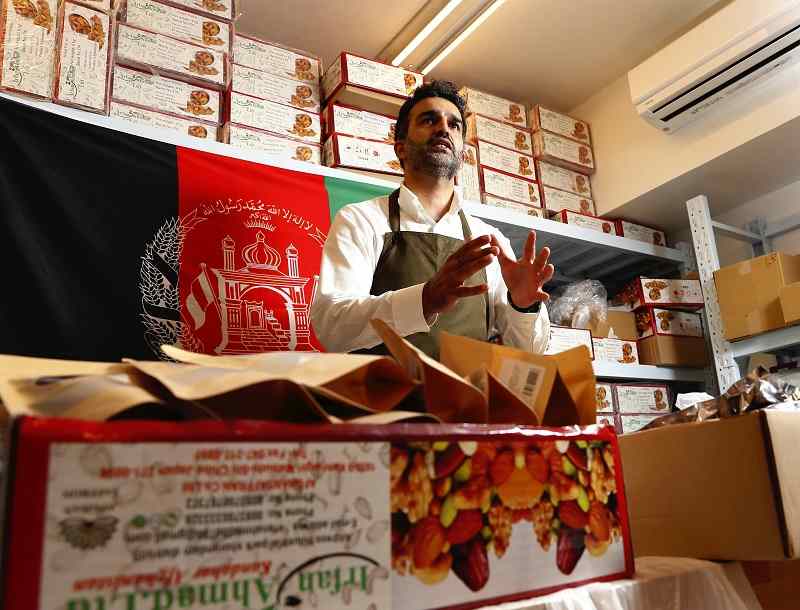
Baburi Ashraf speaks about his home country of Afghanistan at his store in Matsudo, Chiba Prefecture. His store is named Bahar, which means “spring” in both Dari and Pashto, the official languages of Afghanistan.
18:19 JST, September 20, 2021
More than one month has passed since the Taliban captured Kabul, seizing control of the government, and thousands of Afghans living in Japan are worried about the future of their home country.
“I’m worried about the women who’ve made these products,” 39-year-old Baburi Ashraf said at his store in mid-September. Dry fruits including figs and mulberries were lined up for sale in the shop, which is located in a residential area near JR Matsudo Station in Matsudo, Chiba Prefecture.
Baburi came to Japan in 2009 and attended a Japanese language school. After graduating, he started working in 2011 at the Afghan Embassy in Minato Ward, Tokyo. He later got married to a Japanese woman named Ai, who is now 33.
Dry fruits are a specialty of Afghanistan, where fruit-growing is popular, and women are primarily responsible for picking fruit and drying it. There are many widows who lost their husbands in the civil war, and Baburi began importing dry fruits in 2018 and selling them on the internet in the hope of supporting such women. In March this year, he opened his store in Matsudo.
At the start of the recent turmoil in Afghanistan, he lost contact with 30 farming households he had business contracts with. Although he later confirmed their safety, “the Taliban regime may place restrictions on women’s working, like they did before,” Baburi said.
He is even more concerned about his 18-year-old niece. The equivalent of a third-year high school student in Japan, she wants to go to college to become a doctor like her father. Yet his older brother’s family, including his niece, were driven out of Kabul as the Taliban seized the capital. The family took refuge in Jalalabad in eastern Afghanistan.
Under the former Taliban regime that lasted for five years until 2001, “women were deprived of educational opportunities,” said Baburi. He was a high school student at the time and when he came home, he would teach what he had learned to his two sisters, who are two and five years younger and could not go to school.
“What’s going to happen to us in the future?” his niece said in a video she sent late last month to Baburi. He has grown even more worried.
The Afghan Embassy has received a series of inquiries from Baburi’s compatriots in Japan, with questions including “Will we be able to renew our visas in the future?” or “Can I bring my family [in Afghanistan] to live with me in Japan?” There are about 3,500 Afghans now living in Japan.
Baburi said, “If things remain as they are, [Afghanistan] will become a country detached from the common wisdom of the world and closed off.”
“I hope it will be a country in which women can study and work as a matter of course, and support themselves,” he said.
Top Articles in Society
-

Man Infected with Measles Reportedly Dined at Restaurant in Tokyo Station
-

Man Infected with Measles May Have Come in Contact with Many People in Tokyo, Went to Store, Restaurant Around When Symptoms Emerged
-

Woman with Measles Visited Hospital in Tokyo Multiple Times Before Being Diagnosed with Disease
-

Australian Woman Dies After Mishap on Ski Lift in Nagano Prefecture
-

Foreign Snowboarder in Serious Condition After Hanging in Midair from Chairlift in Nagano Prefecture
JN ACCESS RANKING
-

Japan PM Takaichi’s Cabinet Resigns en Masse
-

Japan Institute to Use Domestic Commercial Optical Lattice Clock to Set Japan Standard Time
-

Israeli Ambassador to Japan Speaks about Japan’s Role in the Reconstruction of Gaza
-

Man Infected with Measles Reportedly Dined at Restaurant in Tokyo Station
-

Videos Plagiarized, Reposted with False Subtitles Claiming ‘Ryukyu Belongs to China’; Anti-China False Information Also Posted in Japan




















